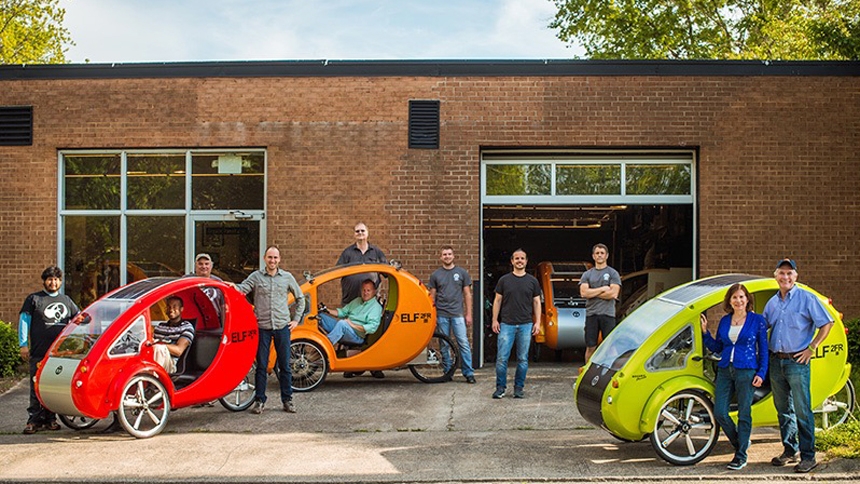
In a reflection on Saint Francis in Laudato Si’, Pope Francis' encyclical on "Care for our Common Home," the pope writes, "Saint Francis is the example par excellence of care for the vulnerable and an integral ecology lived out joyfully and authentically. He is the patron saint of all who study and work in ecology and is loved (for his legacy) by Christians and non-Christians. He was particularly concerned for God’s creation and the poor and outcast. He shows us how inseparable the bond is between concern for nature, justice for the poor, commitment to society, and interior peace."
At Saint Francis of Assisi Parish in Raleigh, one parishioner, Rob Cotter, has taken that to heart. However, his career had started down a different path.
"In the early 1980s, we lived in the Los Angeles area, and I worked in the performance automobile industry," Rob says. "Someone nearby (to where I worked) was building a pedal-powered aircraft, the Gossamer Condor, and I found that shocking. I was working on cars with hundreds of horsepower, and someone was flying at 1/2 hp."
That struck Rob.
"It came as a revelation that everything we were doing was wrong regarding honoring God's creation. This ‘care for creation’ was further emphasized by the tremendous air pollution in LA at the time."
These concerns led Rob down a different path.
"In 1988, I directed the first solar vehicle race in the US, the American Solar Cup," he says.
Fast forward to 2012, when the founding of Organic Transit by Rob and his wife, Maureen, gave life to the ELF! The ELF (Electric, Light, and Fun) is a solar and pedal electric tricycle with a lightweight plastic body. It has room for two people and lots of groceries.
Manufactured in Durham, Rob says of the ELF, "Legally, it's a bicycle, so no license, registration, or insurance is required. However, it looks a lot like a tiny car. It weighs about 160 pounds but can carry a 550-pound payload. Bicycles are wonderful devices but mostly have not changed much in the last 100 years."
Until now! "Bicycles are unsafe, have no weather protection, and are difficult to bring along a passenger. We knew there was a lot of room for improvement," Rob says.
Then there's the automobile. "Another wonderful device," as we all know from experience, "but which are very expensive to own and operate, are polluting, and the majority of car trips are under 10 miles with just one passenger," he points out. That’s when the plan formed.
"Our intention," Rob recalls, "was to create something between a bicycle and a car, but leaning on the bicycle side while still giving a somewhat car-like experience."
They created the ELF to address the enormous environmental cost and impact of transportation.
"Our mission is to create products that make the user, the local community, and the planet healthier," he says. "One of the unexpected markets for the ELF was with the disabled community. People can’t drive a car or ride a bike for many reasons, including physical, neurological, or even legal barriers. About 7% of ELF customers have some disability that prevents them from driving a car. Now they can transport themselves where they want and when they want.
"Over seven years, we built 850 ELFs in Durham, NC, and delivered them to customers in 15 countries," Rob says, "and many of them are still on the road traveling thousands of miles a year."
An oil and gas company took over the company, and almost nothing happened during their ownership of 4 years.
"We were able to reacquire the company this past fall," says Rob, currently the Lead Designer and CEO, "and we are working to resurrect the company on a much larger scale. To keep the company on the right path, we’re looking into a crowdfunding campaign that allows the public to invest in companies they believe in at a much earlier stage.
"The ELF is incredibly efficient, getting the equivalent of nearly 2,300 mpg. Because they're so efficient, they can operate quite well using solar."
Even with the small size and efficiency benefit, the ELF is very safe. Rob points out, "In traveling over 10 million miles, we only tracked 25 accidents with cars and trucks. In those accidents, there were no serious injuries."
And the ELFs have been put to the test commercially as well.
"ELFs have been tested in tough environments, like NYC in the winter, as delivery vehicles," says Rob, pointing out their utility. "They are quick and nimble in urban areas, with the ability to carry hundreds of pounds, pull trailers, and deliver mail."
The benefits in urban areas are many: "Getting delivery trucks off the road, where they block traffic, and replacing them with tiny ELFs that briefly park on sidewalks and take bike paths is a great way to ease traffic congestion and lower costs and pollution."
It also is a step up from the ‘typical’ bike messengers often found in urban environments by providing greater comfort and safety for drivers and more cargo capacity.
Rob is innovative and focused on the future; where does he see solar power moving soon?
Rob says, "Solar in various applications has been around for a long time, whether passive, hot water or photovoltaic. Because of manufacturing advancements, solar is more reasonably priced than ever and is about to displace many conventional energy sources."
Where does this put the ELF? The future is bright!
"This is the first commercial application utilizing solar for transportation. The ELF is an amazing application," Rob enthusiastically opines, "to take the most polluting thing most of us do daily: driving our car and powering it on solar."
The ELF comes in the 2FR, a two-person version, but other models are in the works. It is just one of the ways you can lower your footprint on God’s creation and have a lot of fun while doing it!

